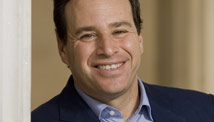PR blowup masks Afghan war's reality

- David Frum: You win or lose wars by using violence to shape global public opinion
- Frum: Images from war can be more potent in public's mind that outcome of battles
- Taliban puts up images of U.S. killing civilians, he says, and U.S. military can't respond in time
- McChrystal blowup masks reality we aren't winning in Afghanistan, Frum says
Editor's note: David Frum writes a weekly column for CNN.com. A special assistant to President Bush in 2001-02, he is the author of six books, including "Comeback: Conservatism That Can Win Again," and is the editor of FrumForum.
(CNN) -- "War is politics by other means," wrote the Prussian philosopher of war Carl von Clausewitz. The career and resignation of Gen. Stanley McChrystal drives home an updated and equally profound truth: "War is PR by other means."
Von Clausewitz's famous dictum was meant as a corrective to obsolete ancient ideas. Primitive warriors might fight for glory, or for booty, or to fulfill a divine commandment. Modern states must think about war and peace more rationally and pragmatically.
My update of von Clausewitz is also a corrective to an obsolete idea. In the modern media age, you no longer win wars by killing maximum numbers of the enemy. You win (or lose) wars by using violence to shape global public opinion.
The classic example of this is the 1968 Tet Offensive in Vietnam.
In February 1968, communist Viet Cong guerrillas staged a grand simultaneous offensive across urban and rural Vietnam. Militarily, Tet was a catastrophe for the Viet Cong. The surprised U.S. forces quickly regrouped, recaptured lost ground and inflicted so many casualties that the Viet Cong were annihilated as an independent entity.
But then something unexpected happened. The battle may have been devastating for the Viet Cong. The television coverage was devastating for the United States. Americans had been assured that they were prevailing in Vietnam. Suddenly the supposedly defeated enemy was besieging the U.S. Embassy compound in Saigon. An image of military failure was indelibly stamped on the TV viewer's mind. That image would matter more to the outcome of the war than tens of thousands of Viet Cong combat deaths.
The Viet Cong's inadvertent discovery has now been integrated into the military strategy of every military insurgency.
The Palestinians have mastered this technique in their battles with Israel. In September 2000, Israeli and Palestinian forces exchanged fire at a crossroads in Gaza. The actual battle would have long ago vanished into obscurity.
But a Palestinian cameraman on the scene captured a startling series of images: a man and terrified boy, pinned by gunfire, the boy suddenly motionless, a Palestinian Pieta. The boy's name was given as Muhammad al-Dura, and the cameraman's images have become as iconic in the Arab and Islamic world as the collapse of the World Trade Center in the United States. Only -- it seems all but certain that the images were deliberately faked, a verdict now confirmed by a French court.
The coalition in Afghanistan faces a similar challenge. Within minutes of any large-scale use of force by coalition forces, the Taliban will be on the air accusing the coalition of the murder of villagers. Some of these encounters are genuine cases of accidental killing of civilians. Some are fabrications and distortions. In every case, the coalition response lags behind the accusation: It takes time to confirm the facts in remote locations.
The Taliban propaganda has had an effect, especially among the Pashtun population, the country's largest ethnic group. U.S. forces have worked to improve their strategic communications. McChrysal had also imposed stricter rules of engagement so as to minimize exploitable accidents in the first place. McChrystal also made a priority of opening his headquarters to the Western media. The flow of information and access was intended to sustain media understanding of the war and, it was hoped, public support in the coalition's home countries.
McChrystal's policy of open access created the opportunity for a freelancer to accumulate just enough titillating quotes to create a career-ending controversy. In years to come, we'll marvel at how unexplosive the quotes really were. Really, it would be much more amazing if McChrystal had run the first headquarters in military history in which nobody grumbled at their commanders back home and their civilian colleagues.
But now the risk is that McChrystal's key insight will be lost: that our job in Afghanistan is not to kill Taliban, but to discredit Taliban; not to hold territory, but to gain consent; not to secure the country, but to establish an effective indigenous government.
The real revelation in the Rolling Stone piece is that McChrystal assessed that the coalition was not succeeding at these tasks, that we are not winning the war. That news got lost in the fuss that McChrystal's staff sometimes groused about their colleagues. But it's the only story that matters.
Last year, President Obama announced two U.S. policies in Afghanistan: a surge in forces and a public deadline for withdrawal. The surge -- 30,000 fewer troops than requested -- has as yet yielded disappointing success. The deadline, however, continues to tick.
Obama has now dismissed the general who acknowledged that the war was not being won and who wanted more troops with which to win it. Has the president now taken a step toward a new set of priorities: withdrawal in first place, success in second?
The opinions in this commentary are solely those of David Frum.
